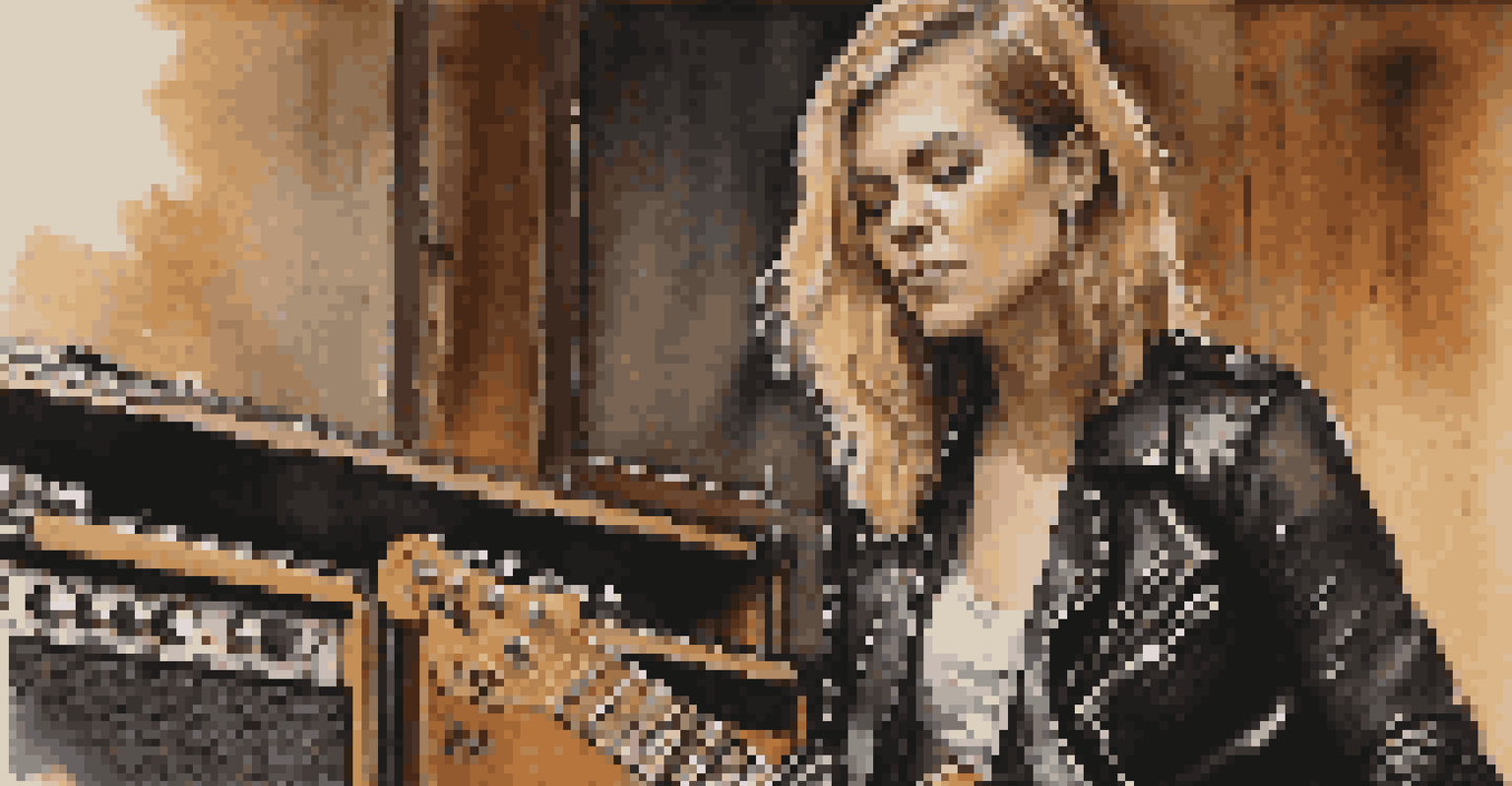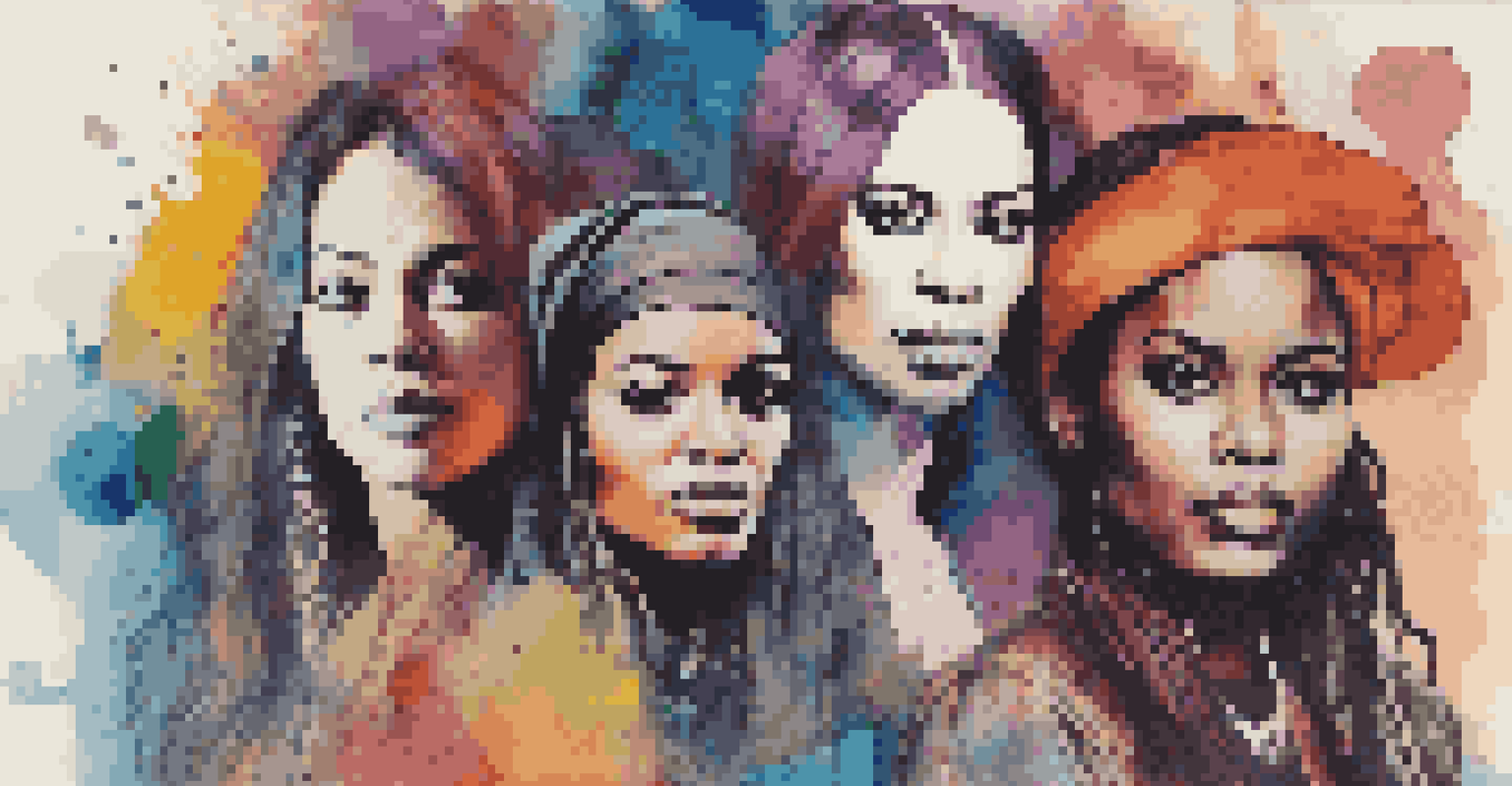Women in Alternative Music: An Exploration of Influence

The Rise of Women in Alternative Music
The alternative music scene has seen a remarkable rise in female talent over the decades, transforming the landscape of the genre. From the gritty sounds of the '90s grunge era to today's indie pop, women have played pivotal roles in shaping the sound and direction of alternative music. Artists like Alanis Morissette and Fiona Apple broke through barriers, showcasing raw emotion and vulnerability that resonated with audiences worldwide.
When you’re a woman in music, you have to be twice as good to get half as far.
As women began to dominate the stage, they brought with them fresh perspectives and powerful narratives, often addressing themes of empowerment, identity, and societal issues. These artists not only challenged the norms but also inspired a new generation of female musicians to find their voice. The impact of their contributions continues to echo in today's music, proving that the influence of women in alternative music is both profound and lasting.
It's essential to recognize that this movement wasn't just about individual success; it was about creating a community. Female artists began to support each other, forming alliances and collaborations that have enriched the genre as a whole. As we explore this journey, it becomes clear that the rise of women in alternative music has been a crucial chapter in the larger narrative of music history.
Trailblazers: Iconic Women Who Changed the Game
When we think of trailblazers in alternative music, names like Björk, PJ Harvey, and Courtney Love come to mind. These artists not only redefined what it meant to be a woman in the industry but also pushed creative boundaries. Björk's eclectic style and innovative sound have influenced countless artists, while PJ Harvey's lyrical depth and raw energy broke the mold for female rock musicians.

Courtney Love, with her unapologetic attitude and fierce stage presence, became a symbol of female rebellion in the '90s, paving the way for others to express their authenticity. These women didn't just make music; they made statements, challenging societal norms and encouraging others to do the same. Their legacies continue to inspire and motivate young female artists to embrace their individuality and creativity.
Women Transform Alternative Music
Female artists have significantly shaped the alternative music scene, bringing fresh perspectives and powerful narratives that resonate with audiences.
By examining the impact of these trailblazers, we can appreciate the importance of representation in music. Their stories remind us that breaking barriers is not only possible but necessary for progress in any field. The contributions of these iconic women have left an indelible mark on the genre and continue to influence upcoming generations.
The Role of Female Bands in Alternative Music
Female-led bands have played an essential role in the evolution of alternative music, often bringing a collaborative spirit and unique sound to the forefront. Groups like The Breeders and Sleater-Kinney not only showcased female talent but also challenged the predominance of male-centric lineups in the rock scene. Their music resonated with many, offering relatable stories and experiences that connected deeply with fans.
The most important thing is that you have to be true to yourself and your art.
These bands have been instrumental in creating spaces where women can express themselves freely and authentically. The camaraderie within these groups often translates into powerful performances that captivate audiences. By highlighting the importance of collaboration, female bands have redefined the dynamics of music-making, proving that shared creativity can lead to groundbreaking results.
Moreover, the impact of female bands extends beyond music; they serve as role models for aspiring musicians. By seeing women take charge and succeed in what was traditionally a male-dominated industry, young artists feel empowered to pursue their dreams. The legacy of female bands in alternative music is a testament to the strength and resilience of women in the arts.
Breaking Stereotypes: Women Redefining Genres
Women in alternative music have continually broken stereotypes, redefining genres and challenging preconceived notions of what female musicians should look and sound like. Artists like St. Vincent and Liz Phair have blurred the lines between genres, incorporating elements of rock, pop, and electronic music to create distinctive sounds. Their willingness to experiment and innovate has opened doors for others to explore their artistic boundaries.
This genre-blending approach not only enriches the music itself but also reflects the diverse experiences of women today. By pushing against the constraints of traditional genres, these artists empower themselves and others to embrace their unique identities. This shift encourages listeners to appreciate music beyond labels, fostering a more inclusive environment for all artists.
Representation Matters in Music
Increased representation of women in music fosters diversity, encouraging aspiring artists and creating a more inclusive industry.
The impact of these genre-defying women cannot be understated. They have not only inspired their peers but also shaped the musical landscape in ways that resonate with a broader audience. As we witness the evolution of music, it's clear that women will continue to play a vital role in redefining genres and challenging the status quo.
The Importance of Representation in Music
Representation in music is crucial for fostering diversity and inclusivity within the industry. When women see other women succeeding in alternative music, it sends a powerful message: their voices matter. This visibility encourages aspiring artists to pursue their passion and contributes to a more diverse soundscape that reflects the richness of human experience.
Moreover, representation goes beyond just the artists themselves; it extends to producers, managers, and executives within the music industry. By amplifying women's voices at all levels of the industry, we can create a more equitable environment that nurtures talent regardless of gender. This holistic approach ensures that diverse stories and perspectives are told through music.
As we advocate for more representation, we also celebrate the unique contributions that women bring to alternative music. Their diverse backgrounds, experiences, and talents enrich the genre, making it more vibrant and relatable. The push for representation is not just a trend; it's a necessary step toward a more inclusive and representative music industry.
Modern Influencers: Today's Leading Ladies
Today's alternative music scene is brimming with talented women who are shaping the future of the genre. Artists like Halsey, Billie Eilish, and Phoebe Bridgers have captured the hearts of millions with their innovative sounds and authentic storytelling. Their willingness to tackle personal and societal issues resonates deeply with fans, making their music both relatable and impactful.
These modern influencers are not only musicians but also advocates for change. They use their platforms to address important topics such as mental health, body positivity, and social justice, encouraging their listeners to engage with these issues. By being open and vulnerable in their art, they create a safe space for fans to explore their feelings and experiences.
Challenges Remain for Female Artists
Despite progress, women in alternative music still face challenges such as sexism and unequal pay, highlighting the need for ongoing support and advocacy.
As we look to the future, it's clear that the influence of these women will only continue to grow. Their dedication to authenticity and social awareness sets a powerful example for aspiring musicians everywhere. The new wave of female artists in alternative music is a testament to the genre's evolution and its capacity for change.
Challenges Faced by Women in Alternative Music
Despite the progress made, women in alternative music still face numerous challenges that can hinder their careers. Issues such as sexism, unequal pay, and lack of representation in decision-making roles remain prevalent. Many female artists find themselves battling stereotypes and preconceived notions about their abilities, which can be disheartening in an already competitive industry.
Moreover, the physical demands of touring and performing can disproportionately affect women, especially those who are balancing family responsibilities. The pressure to conform to certain standards of appearance and behavior can also create additional stress, making it difficult for women to focus solely on their music. These challenges highlight the need for continued advocacy and support for female artists.

However, many women are finding ways to navigate these obstacles, forging paths for themselves and others. By sharing their stories and experiences, they raise awareness about the issues at hand, fostering a sense of community among female musicians. The resilience shown by these artists is inspiring and serves as a reminder that change is possible when women support each other.
The Future of Women in Alternative Music
The future of women in alternative music looks promising, with a new generation of artists ready to take the stage. As more women continue to break into the industry, we can expect to see even more diversity in sound and representation. This evolution is essential for creating a music landscape that truly reflects the world we live in, filled with varied voices and experiences.
With the rise of digital platforms, female artists have more opportunities than ever to share their music and connect with fans. Social media enables them to build their own brands and engage directly with their audience, bypassing traditional gatekeepers. This shift empowers women to take control of their careers and shape their narratives on their own terms.
As we celebrate the achievements of women in alternative music, we must also commit to supporting and uplifting these artists. By championing their work and advocating for equality in the industry, we can help ensure that the future remains bright for women in music. The journey is ongoing, but the path ahead is filled with potential and promise.